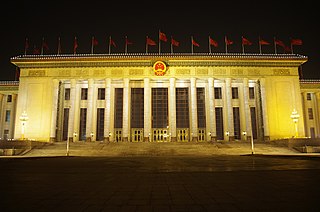
A copyright is a type of intellectual property that gives the creator of an original work, or another right holder, the exclusive and legally secured right to copy, distribute, adapt, display, and perform a creative work, usually for a limited time. The creative work may be in a literary, artistic, educational, or musical form. Copyright is intended to protect the original expression of an idea in the form of a creative work, but not the idea itself. A copyright is subject to limitations based on public interest considerations, such as the fair use doctrine in the United States.

The Sino-British Joint Declaration was a treaty between the governments of the United Kingdom and China signed in 1984 setting the conditions in which Hong Kong was transferred to Chinese control and for the governance of the territory after 1 July 1997.
Union Royale Belge des Sociétés de Football Association ASBL v Jean-Marc Bosman (1995) C-415/93 is a 1995 European Court of Justice decision concerning freedom of movement for workers, freedom of association, and direct effect of article 39 of the Treaty of Rome.

The special territories of members of the European Economic Area (EEA) are the 32 special territories of EU member states and EFTA member states which, for historical, geographical, or political reasons, enjoy special status within or outside the European Union and the European Free Trade Association.

Liquidation is the process in accounting by which a company is brought to an end. The assets and property of the business are redistributed. When a firm has been liquidated, it is sometimes referred to as wound-up or dissolved, although dissolution technically refers to the last stage of liquidation. The process of liquidation also arises when customs, an authority or agency in a country responsible for collecting and safeguarding customs duties, determines the final computation or ascertainment of the duties or drawback accruing on an entry.

The British Indian Ocean Territory is an overseas territory of the United Kingdom. It is administered by a Commissioner, located at the Foreign and Commonwealth Office in London. There is no Governor appointed to represent the King in the territory as there are no permanent inhabitants.

The law of the Hong Kong Special Administrative Region has its foundation in the English common law system, inherited from being a former British colony and dependent territory. There are several sources of law, the primary ones being statutes enacted by the Legislative Council of Hong Kong and case law made by decisions of the courts of Hong Kong.

European Union citizenship is afforded to all nationals of member states of the European Union (EU). It was formally created with the adoption of the 1992 Maastricht Treaty, at the same time as the creation of the EU. EU citizenship is additional to, as it does not replace, national citizenship. It affords EU citizens with rights, freedoms and legal protections available under EU law.

The European single market, also known as the European internal market or the European common market, is the single market comprising mainly the 27 member states of the European Union (EU). With certain exceptions, it also comprises Iceland, Liechtenstein, Norway, and Switzerland. The single market seeks to guarantee the free movement of goods, capital, services, and people, known collectively as the "four freedoms". This is achieved through common rules and standards that all participating states are legally committed to follow.

The Hague Convention on the Law Applicable to Trusts and on their Recognition, or Hague Trust Convention is a multilateral treaty developed by the Hague Conference on Private International Law on the Law Applicable to Trusts. It concluded on 1 July 1985, entered into force 1 January 1992, and is as of September 2017 ratified by 14 countries. The Convention uses a harmonised definition of a trust, which is the subject of the convention, and sets conflict rules for resolving problems in the choice of the applicable law. The key provisions of the Convention are:

Terence Michael Elkan Barnet Etherton, Baron Etherton, is a British retired judge and member of the House of Lords. He was the Master of the Rolls and Head of Civil Justice from 2016 to 2021 and Chancellor of the High Court from 2013 to 2016.

United Kingdom enterprise law concerns the ownership and regulation of organisations producing goods and services in the UK, European and international economy. Private enterprises are usually incorporated under the Companies Act 2006, regulated by company law, competition law, and insolvency law, while almost one third of the workforce and half of the UK economy is in enterprises subject to special regulation. Enterprise law mediates the rights and duties of investors, workers, consumers and the public to ensure efficient production, and deliver services that UK and international law sees as universal human rights. Labour, company, competition and insolvency law create general rights for stakeholders, and set a basic framework for enterprise governance, but rules of governance, competition and insolvency are altered in specific enterprises to uphold the public interest, as well as civil and social rights. Universities and schools have traditionally been publicly established, and socially regulated, to ensure universal education. The National Health Service was set up in 1946 to provide everyone with free health care, regardless of class or income, paid for by progressive taxation. The UK government controls monetary policy and regulates private banking through the publicly owned Bank of England, to complement its fiscal policy. Taxation and spending composes nearly half of total economic activity, but this has diminished since 1979.

The primary law governing nationality in the United Kingdom is the British Nationality Act 1981, which came into force on 1 January 1983. Regulations apply to the British Islands, which include the UK itself and the Crown dependencies, and the 14 British Overseas Territories.

The Company Directors Disqualification Act 1986 forms part of UK company law and sets out the procedures for company directors to be disqualified in certain cases of misconduct.
Kamer van Koophandel en Fabrieken voor Amsterdam v Inspire Art Ltd (2003) C-167/01 is a leading corporate law case, concerning the EU law of freedom of establishment for companies.
The Unidroit convention on substantive rules for intermediated securities, also known as the Geneva Securities Convention, was adopted on 9 October 2009. It has been signed by only one of the 40 negotiating States (Bangladesh), but not entered into force. The official commentary was published in 2012.

International Transport Workers Federation v Viking Line ABP (2007) C-438/05 is an EU law case of the European Court of Justice, in which it was held that there is a positive right to strike, but the exercise of that right could infringe a business's freedom of establishment under the Treaty on the Functioning of the European Union article 49. Often called The Rosella case or the Viking case, it is relevant to all labour law within the European Union. The decision has been criticised for the Court's inarticulate line of reasoning, and its disregard of fundamental human rights.
Cartesio Oktató és Szolgáltató bt (2008) C-210/06 is a European company law case concerning the right of freedom of establishment.

Überseering BV v Nordic Construction Company Baumanagement GmbH (2002) C-208/00 is a European company law case, concerning the right of freedom of establishment.















